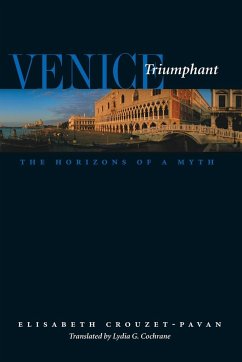Perhaps more than in any other city, Venice has been shaped by its environment. The lagoon on which it was built isolated the city's inhabitants from mainland Europe, forcing them to look seaward for their survival and to establish a maritime empire that generated incalculable wealth, making Venice the envy of Renaissance Europe. In Venice Triumphant, Elisabeth Crouzet-Pavan provides a rich, multilayered history of Venice from Roman times to the sixteenth century. Instead of employing a rigidly chronological framework, she looks at the history of Venice thematically, focusing on the relationship between the city and its unique physical milieu in a way that emphasizes complexity and continuity. Central to Crouzet-Pavan's discussion is her concept of l'imaginaire, literally translated as "the imaginary" and here meaning the many symbolic terms Venetians created to describe and understand the peculiar space they inhabited and, by extension, themselves. One key example of l'imaginaire is Venetians' use of the term "the continent" to refer, somewhat dismissively, to Italy, Germany, and other lands beyond the lagoon in order to emphasize their own distinctive maritime identity. As Crouzet-Pavan shows, this sense of exceptionalism impacts every aspect of Venetian history: its art and architecture; its involvement with mainland politics; its commercial, civic, and political institutions; and the shape of daily life in its homes, alleys, and courtyards. Elegantly translated by Lydia G. Cochrane, Venice Triumphant offers a bold new perspective on the world's most beautiful-and remarkable-city.
Hinweis: Dieser Artikel kann nur an eine deutsche Lieferadresse ausgeliefert werden.
Hinweis: Dieser Artikel kann nur an eine deutsche Lieferadresse ausgeliefert werden.








